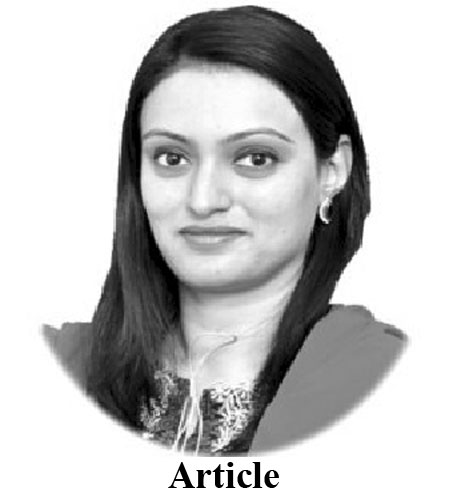Reema Shaukat
THIS year like previous years 8th of March, Women’s Day was celebrated as worldwide event to honour women’s accomplishments from political to social achievements and thus raising voice for gender equality. It has been observed since the early 1900s and is now recognised each year on March 8. This day is not affiliated with any one group, but brings together governments, women’s organisations and other civil rights institutions to praise women for being role models despite hurdles and societal pressures. The day was recognised by the United Nations in 1975, but ever since it has created a theme each year for the celebration. This year, International Women’s Day theme by UN was I am Generation Equality: Realizing Women’s Rights, which suggested to build a gender-balanced world. The theme is aligned with UN Women’s new multigenerational campaign Generation Equality which marks the 25th anniversary of the Beijing Declaration and Platform for Action.
The year 2020 is a pivotal year for advancing gender equality worldwide, as the global community takes stock of progress made for women’s rights since the adoption of the Beijing Platform for Action. It will also mark several other galvanizing moments in the gender equality movement: a five-year milestone towards achieving the Sustainable Development Goals; the 20th anniversary of UN Security Council resolution 1325 on women, peace and security; and the 10th anniversary of UN Women’s establishment. The year 2020 represents an unmissable opportunity to mobilize global action to achieve gender equality and human rights of all women and girls. Like rest of the world, in Pakistan too, different rallies, events, talks were arranged throughout the country to acknowledge the efforts of women in every walk of life. Though there were many pro and anti-rallies and controversial debates which somehow caused disturbance and misled the actual message and content of Women Day.
Generally speaking, one of the important facets which is often neglected while talking about women rights and abuse is the dilemma of rape. This word itself is considered as stigma in society and many cases of rape if highlighted or reported end up with no conclusive change in mind-set of society as a whole. Such incidents are becoming common and many factors are held responsible for these incidents of rape. Unfortunately, rape is also used a tool of punishment in conflict zones and history suggests that this one element of violence is used as an effective weapon and strategy for disarming psychological war. This weapon of rape was used by many combatants and this global issue has no national boundaries of ideology or religion. It is more of associated with masculine identity commonly but in war times there is often violation of men and children too through different means of torture and distress. Therefore, it often does not remain gender bound but women being soft target are more of victim of rape in war precincts.
There are many examples of such mass rapes during conflicts and war times during Rawanda genocide, Bosnia & Kosovo conflicts, Khojaly massacre by Armenian forces in Azerbaijan and not to forget Kashmir where such incidents occur frequently to suppress freedom movement. In Kashmir history mass rape incident ensued in area of Kunan Poshpora in February 1991 and social stigma generated out of this incident is that women still face difficulties in getting married. Until recently, there existed no punishment for “war rape” in international law. War crimes or humanitarian law specifically focuses on the treatment of the civilian population and “any devastation not justified by military necessity”. Thereafter, war rape has rarely been prosecuted as a war crime. Since 1949 Article 27 of the Fourth Geneva Convention explicitly prohibits wartime rape and enforced prostitution.
The South Asian subcontinent is the least gender sensitive region in the world. It is the only region in the world where men outnumber women. In Pakistan, women do face many challenges but with passage of time trends are changing and their services are acknowledged. Be it was their role in Pakistan freedom movement or their role in Pakistan’s defence, they outshine everywhere. Generally Western media portrays Pakistani women as victim of Karo Kari, Hadood Ordinance or Qasas but with induction of laws on honour killing and awareness in women for their rights, the ratio of such incidents have gone very low. Working women is the one of the classes facing major problems in Pakistan including harassment, prejudice and less salary packages but despite that time is changing gradually and women are now highly appreciated for their roles not only in domestic chores but globally also. In Pakistan there is a need to educate women as alone educating a girl suggests one is contouring a whole generation.
There is a need to create awareness among them on their rights in family laws, social justice, women and child health and other vital women rights which can provide them secure and better living even as sole bread earner of family. Though many women are part of politics and decision making processes but worldwide it is witnessed that women are not part of peace processes between conflicted countries. The words of Margaret Thatcher truly reflect this scenario that, “Any woman who understands the problems of running a home will be nearer to understanding the problems of running a country”. Therefore, your women need appreciation, care, support, affection and salutation for every duty they perform in any capacity as it will not boost their energy but their contribution towards better society will increase manifolds. Providing women and girls with equal access to education, health care, decent work, and representation in political and economic decision-making processes will fuel sustainable economies and benefit societies and humanity at large.
— The writer works for Pakistan Institute for Conflict and Security Studies, a think-tank based in Islamabad.










